- Home
- Will Hobbs
Far North Page 7
Far North Read online
Page 7
Raymond looked around quickly, then pointed to a thicket of bushy trees he said were alders, over by the switchbacks at the bottom of the trail. We ran over there, found the forked branches he’d envisioned, and cut out our oarlocks with the bow saw. All the time we were racing, knowing the Chinook couldn’t last.
By the time darkness was falling—around three-thirty—we were nearly done with the raft itself. We had a little more work to do on the oarlocks, but we could do that first thing tomorrow, maybe while Johnny worked on the oars. We’d been working in such a frenzy we hadn’t even thought about being hungry. We started up the steep trail that led to the top of the falls.
The old man wasn’t in camp. “Maybe he got a moose,” Raymond said.
“Either that or something’s happened to him,” I said. I grabbed the flashlight, which by now wasn’t worth much, and we started upriver. About a mile from camp we saw a dark shape coming our way. The old man’s parka hood was thrown back; we could make out the patch of snow-white hair.
“You get a moose?” Raymond asked him.
Johnny Raven broke into a smile. “Moose,” Johnny repeated, bringing his hands close together as if to say “small moose.” First I thought he was saying he’d shot a small moose, maybe a calf, but then he started leading us back toward camp.
“Maybe he only saw one,” Raymond said, disappointed. I began to wonder how we were going to explain to Johnny about the raft.
Once back in camp, the old man collected the skinning knife and the whetstone, the frying pan, a couple of cooking pots, and the red wool blanket. Raymond and I looked at each other, wondering what was going on. Johnny threw some rose hips into one of the pots and arranged the other things in the packsack. Then he motioned for us to follow him.
“He really got one!” Raymond exclaimed, beaming. “He got a moose, and he’s taking us to go eat at the moose.”
Sky-high with expectation, we followed the old man upstream to the carcass of an enormous bull moose. I just stood there, astonished at the reality of it lying dead right in front of us. Johnny had already gutted it. Here was a mountain of meat—the antlers measured at least five feet across. I let out a victory whoop and asked Raymond, “How much would this moose weigh?”
“Over a thousand pounds for sure,” he replied, “maybe a lot more.”
“How come he said it was a little one?”
Raymond laughed. “That’s just like those old guys. They never brag—it’s bad luck.”
I was already wondering how we were going to get all this meat down to the raft. We couldn’t afford the time. The arctic air could come back and freeze the river real quick.
The old man was skinning the moose by the flickering beam of Raymond’s flashlight. I got a fire going with the butane lighter and some shredded birchbark from my daypack, like the old man always used. By this time I’d caught on to always having some handy. The birchbark caught quickly and flamed hot, giving off black smoke from all the resin in it. Johnny Raven brought over a big hunk of fat, which I started melting in the pan, and then he returned shortly with the tongue of the moose, indicating I should cook it in the pan. It wouldn’t have been my first choice.
Raymond cut thick filets for us from the tenderloin along the backbone. We skewered them with sticks and roasted them suspended above the fire. The moment a piece began to look about halfway cooked, I removed it from the fire and sliced it into thin strips with my pocket knife for Raymond and me. Johnny, we could see, was waiting for the tongue, which was sizzling and spattering in the pan.
I started wolfing down huge mouthfuls of meat. Johnny reached over and touched my arm, cautioning me to slow down. I followed his advice, chewing more slowly, but the meat was so delicious and I was so hungry I kept eating until my stomach felt like a cement mixer. Then I drank some tea. “Should we tell him about the raft now?” I asked Raymond.
“I think wait until tomorrow morning,” he said. “I kind of hate to make him think about anything else. Just let him enjoy his moose.”
Raymond and I returned to the brush teepee. Johnny spent the night upriver by the moose, sitting by the fire and keeping guard. “Against wolves or bears,” Raymond said. “People say bears can smell something dead from miles away.”
The warm Chinook kept blowing: forty degrees above zero, even into the night. So far our luck was holding.
A couple of hours before first light we built up the signal fire and headed back to the old man. We wanted to eat some more of the moose and then get the oars made as soon as possible. As soon as we’d eaten our fill, Raymond began to explain to the old man what we had decided to do. At first Raymond tried in English, speaking slowly and simply, but he had to give that up. Then he quickly gathered up some little sticks, snapped them into lengths, and made a model of the raft. I kept watching the old man’s face as Raymond acted out a rowing motion. Just that quickly, the old man was wagging his head. “No,” he said. “No good.” He pointed straight down at the ground. “Camp here,” he said.
“Try again,” I told Raymond. “He doesn’t understand that we could get all the way down the river, get out of here.”
Raymond tried again. But old Johnny Raven understood perfectly well. He started talking rapidly in his own language, shaking his head all the while. He went to the bank of the Nahanni and came back with a big chunk of ice in his hands. He set it down squarely in front of Raymond’s model raft.
“What’s that supposed to mean?” I asked.
“I guess that we’ll get stopped by ice,” Raymond said. “I guess he’s saying that the river will freeze up again before we get out.”
“Well, what does he think we should do?” I asked, all out of patience.
“I think he wants us to move camp here, to the moose. That’s what they used to do in the old days. In the winter they would move to the moose someone had killed. They’d stay there until they’d eaten the whole moose, and tanned the hide and so on. We’d have to build another brush teepee here.”
The old man stood up and spread his arms wide, then imitated the sound of a droning airplane motor. Apparently he still thought we were going to be rescued.
“What if it doesn’t come?” I shouted.
“I know, I know,” Raymond said. “Even so, he thinks we should stay here. I guess he’s thinking we could make dry meat from most of the moose, to preserve it, and just wait for the airplane.”
“Along about January that would get old,” I said.
The old man’s eyes, which usually were looking away, were now going from Raymond’s to mine and back. He was wild with frustration, not being able to talk to us. He reached for the rifle and emptied the magazine of shells—three of them. Then he held up three fingers.
“What’s that supposed to mean?” I said. “Showing us he killed the moose with one shot? I thought they never bragged.”
Raymond said, “He wants to make sure we know he still has three left. I guess he’s thinking—hoping—we can get a lot more meat.”
The old man was pointing upstream. “Moose …sheep…caribou,” he said in English. Then he pointed downstream, and he made a cutting motion with his fingers, right across his throat.
Raymond said, “Looks to me like he’s saying that down in the canyons there won’t be any game. Upstream we can get more meat.”
“So what’s more important?” I asked hotly. “Being where there’s more game or getting out of here?”
“I don’t know,” Raymond said slowly. “I guess that’s the question.”
“How long would this moose last us?”
“I don’t know exactly. Maybe a couple of months.”
“And the river breaks up in early May. What are we talking about now, spending the winter?”
“I guess that’s why he showed us the shells. Johnny must think it could be done.”
From the corner of my eye I spotted some motion. It was a raven flying from the top of a tree to the ground by the moose. The huge black bird was looking at us carefu
lly with its slanted black eyes, then looking back to the moose. It took a few hops closer, looked at us again.
The old man paid little attention to the scruffy-looking raven.
I said to Raymond, “You said you have to be lucky to get a moose. What if his luck runs out?”
“It would be just like back in the old days,” Raymond said. “Sometimes people starved. He knows that. He was there.”
I started counting on my fingers. “November—December—January—February—March—April—May.”
I could see the uncertainty in Raymond’s face. He wasn’t sure I was right. He was actually considering spending the winter here. “You’ve got to be kidding!” I said, and I could feel my face flush. “You just admitted we could starve to death!”
“These old guys know a lot,” he said defensively. “We should at least listen to what he’s saying.”
“You can’t even speak his language!”
Raymond turned away, like I’d hit him with a whip.
“Look,” I said, trying to calm down. “Take a look at the river, will you? It’s running open!”
His eyes were digging a hole in the ground. “I know,” he said.
I noticed the raven tearing at a scrap of flesh sticking out from the hide. I picked up a hefty stick and heaved it at the raven as hard as I could. I almost hit it. The raven protested with a loud squawk as it rose with heavy wingbeats, landing back in the top of the spruce.
The old man was distressed, biting his lip, looking from me over to Raymond.
“Don’t ever do that!” Raymond snapped, looking at me as if I was a stranger and an idiot. “Scare him off, but don’t hurt him,” Raymond said.
“You scare him off next time,” I snapped back.
I was all worked up. I reached for the ax. “I’m going to make the oars myself and finish the raft,” I told him. “If the river’s still open when I finish, I’m going to go. I’ll take a little of the moose meat and I’ll take one of the waterproof boxes, for my sleeping bag. I’ll just take a few things—you guys can keep everything else. Spend the winter back here? I don’t think so. I’d rather take my chances on the river. I want you to come with me, Raymond, but if you decide to stay, no hard feelings.”
Raymond walked away, sat down on a log. I stood there waiting. I knew I wanted him with me. I’d need him to help manage the raft.
The old man was cutting scraps from the carcass and flicking them over toward the spruce. The raven swooped to the ground and started hopping around, picking up the scraps and swallowing them whole as the old man spoke to the shaggy-throated bird in his language.
At last Raymond stood up. He went to his great-uncle, not to me. He said, “I’m sorry, Johnny. I’m not like you. You used to live out on the land. Maybe you still can. Maybe you just think you can do it, even though you only have three bullets. You aren’t so young anymore, Johnny. Maybe you just want to live the way you used to one more time. I know how you elders think it was much better back then—that’s what you’re always saying. But this is now, don’t you see?”
The old man may not have understood the words, but it was apparent from the mournful expression on his gentle face that he understood completely that Raymond had sided with me. He looked older than ever, immeasurably sad. “Okay,” he said softly. “Okay, Raymond.”
To my surprise the old man got up, came over to me, and made a short speech to me in his own language. I was struck by his frailty, yet awed by his great dignity. For a moment I was ashamed that I had won Raymond away from him. He put his hand out. I started to shake it, then realized he was asking for the ax that was in my hand.
“He’s going to help us make the oars,” Raymond explained. “He’s going to come with us.”
11
IT HAD BEEN ALL we could do to get the old man to leave that moose behind and get on the raft. Old Johnny must have been thinking we’d wait until the following day; he’d only roughed out the semblance of oars. But the Chinook winds seemed to be letting up and we were in a panic to get going.
We had a couple of hundred pounds of meat on the raft and even the moose hide, which Johnny had insisted upon, but we’d broken the old man’s heart leaving so much of the animal behind. Raymond felt awful about it. “Johnny’ll never have any luck with moose again,” he muttered on our last portage around the falls. That’s when Raymond walked to the edge of the cliffs at Virginia Falls, right out over the brink, and heaved his electric guitar into the maelstrom. Raymond’s mouth was like a jagged scar on his face.
By the time we finally pushed off and started down through choppy water into the painted canyon, the stony slopes of Sunblood Mountain were glowing blood-red in the late sun. It was the sixteenth of November. Each of us was wearing a pair of Raymond’s gym shoes, having crammed our winter boots and Johnny’s tall moccasins into our limited dry storage along with changes of clothing, our sleeping bags, and Johnny’s blanket.
The river narrowed between cliffs that were splashed with reds and yellows, and the raft was funneled into a train of high waves. Standing at the oars, struggling to try to get control of the raft, Raymond and I were barely managing to stay on our feet. It looked like our oarlocks were going to work well enough, but we’d have to figure out better what we were trying to do with the oars if we were going to actually control the raft, as heavy as it was.
Every time the raft wallowed through a wave, the entire deck was awash with water. At the back, the old man was sitting atop the bigger piece of moose meat, the better part of a hindquarter, hanging on to the cord that tied the meat down. The army boxes and the rest of the gear was lashed down toward the front. My feet hurt so much with the cold I wanted to scream. The water temperature couldn’t have been but a few degrees above freezing. I had to tell myself that our feet would be okay despite the pain, as long as the air temperature stayed above freezing too.
As we rounded a bend I glanced back and saw the falls vanish. Bigger than life one moment, the central fact of our lives, gone the next. Another bend in the river and Raymond gave a shout. He was pointing toward a driftpile of jumbled logs at the tip of an island in the middle of the river. Then I saw he was pointing at a piece of metal just above the waterline. A piece of the Cessna, I thought.
“Let’s get to shore!” I yelled, and we spun the raft sideways in the current, rowing as hard as we could for shore. The island was slipping by despite our efforts. It looked as if we weren’t going to make it, but finally we were able to reach calmer water, and we beached at the bottom tip of the island.
My feet hurt with each step as we hobbled back up to the big driftpile. I was afraid of what we might find there, but I knew we had to look. I walked out onto a log that was sawing up and down with the current. It was a piece of wing that was showing. A length of cable stuck out of both ends and trailed in the water. There was nothing else to be seen.
I turned to go, but now the old man walked out onto the log, and he squatted down and began to yank on the cable, trying to free it. “We’re losing daylight,” I fretted.
The old man persisted. I didn’t want to yell at him.
All three of us pulled on the cable together, and it tore free, about fifteen feet of it. “I suppose it will come in handy,” I said. “It’s a lot stronger than parachute cord. Let’s get going!”
Once we got back into the current, the rapids never let up. We lurched and spun, sloshed and wallowed through miles of canyon lined with slabs of rock fallen from the cliffs and pinnacles above. We struck a few rocks that decided to let us by and barely avoided several boulders that would have thrown us all into the river had we breached on them. We rounded a bend and Raymond yelled, “Sweeper!” Barely, just barely, we managed to avoid a tall spruce tree that had fallen into the river yet remained rooted to the bank. By now the day was going dim and we had nowhere to land. I began to wonder if we were going to be trapped out on the river by the darkness.
It was all but dark when the canyon walls gave way on the right, where
a creek was splashing into the river through a gravel bar. We were exhausted by the time we worked the raft to the shallows, but pleased at how well we were working together now. We had so much more control of the raft than before.
Fortunately, the beach was littered with driftwood. We built up a fire. It felt good to get into some dry clothes, especially dry boots. We erected a framework of poles all around the fire to begin the slow process of drying our wet clothes without burning them. “How far do you think we came today?” I asked Raymond. “It felt like a lot of miles to me,” I added hopefully.
“Pretty far,” Raymond said.
I pressed him. “What I mean is, if it’s about two hundred miles from the falls to Nahanni Butte, how many do we have behind us?”
“Your guess is as good as mine. Maybe ten klicks—six miles or so?”
All at once the wind turned around and started blowing from a different direction. I was worried enough to dig out the compass. Clint had said the Chinook blows from the west. This wind was blowing from the northeast. The old man saw me looking at the compass. He knew exactly what I was thinking. I felt sick, knowing what this meant. There was no doubting that this was air coming down from the Arctic Ocean, not the Pacific. Johnny Raven knew his directions without a compass, and he’d already figured out that the Chinook was over.
Johnny offered me some rose hip tea. It tasted warm and good, but it did nothing to calm my fears.
The old man spoke at great length around the campfire that night, telling a long story to Raymond, who couldn’t understand him. Even so, Raymond was listening, listening intently as if he understood every word. I think it helped him somehow to calm himself down.
Remembering how fast the river could freeze up, I was too nervous to sleep. I could still feel the rumbling of the falls through the ground. I kept seeing the plane crashing against the rock, Clint being thrown into the whitewater. I kept wondering if my father was still searching. I thought he would be. But how could he find us down here?

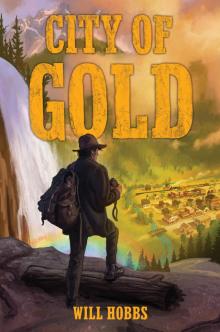 City of Gold
City of Gold Kokopelli's Flute
Kokopelli's Flute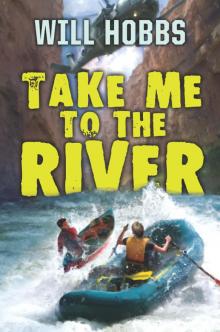 Take Me to the River
Take Me to the River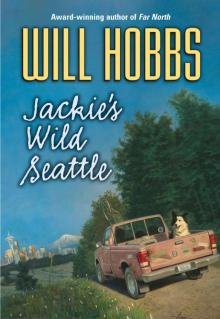 Jackie's Wild Seattle
Jackie's Wild Seattle The Maze
The Maze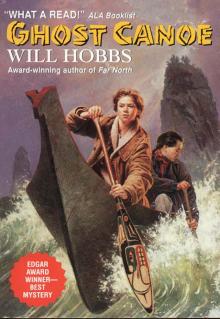 Ghost Canoe
Ghost Canoe Never Say Die
Never Say Die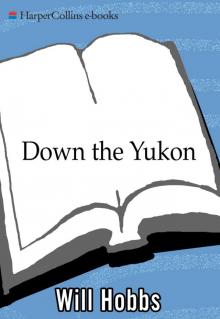 Down the Yukon
Down the Yukon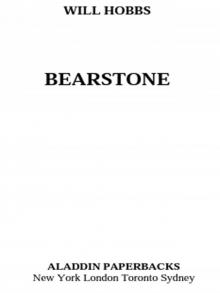 Bearstone
Bearstone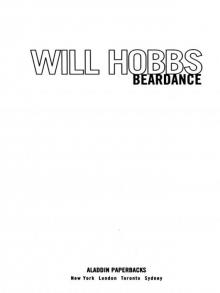 Beardance
Beardance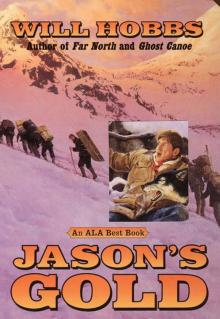 Jason's Gold
Jason's Gold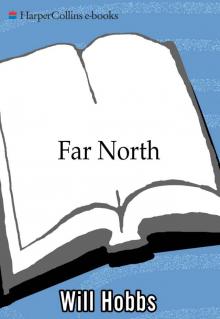 Far North
Far North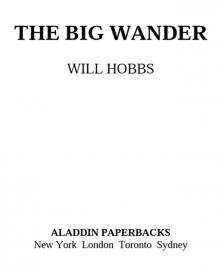 The Big Wander
The Big Wander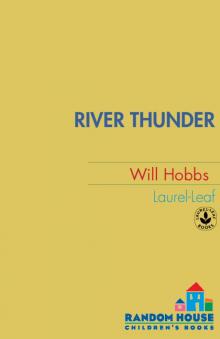 River Thunder
River Thunder Downriver
Downriver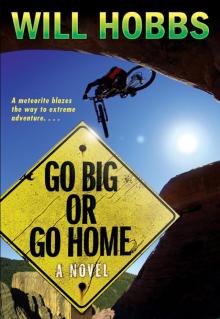 Go Big or Go Home
Go Big or Go Home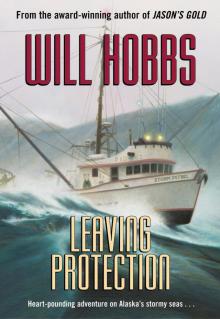 Leaving Protection
Leaving Protection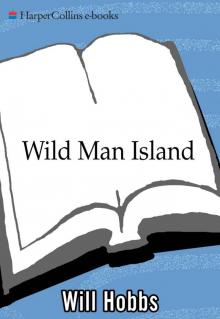 Wild Man Island
Wild Man Island